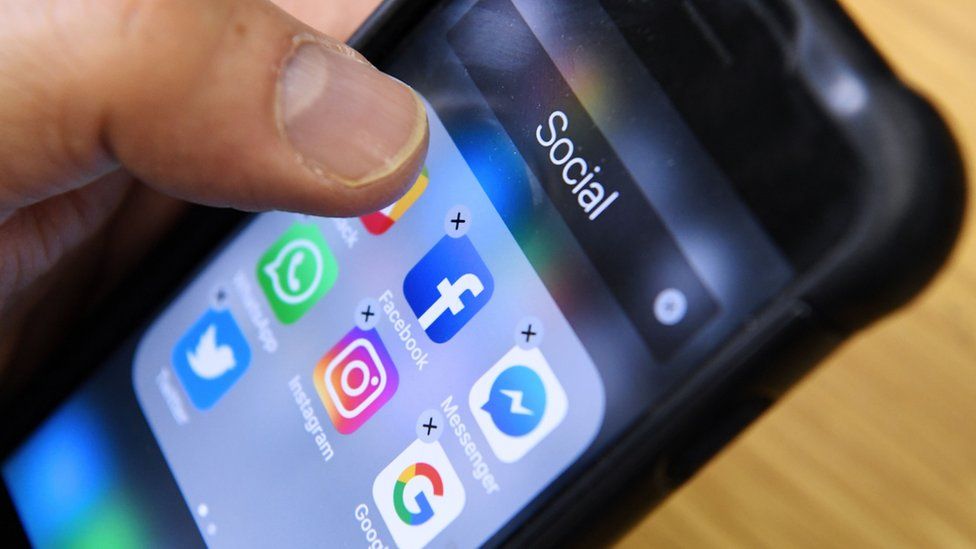Ukraine invasion: Russia restricts social media access
- Published

Russia has limited Twitter in parts of Russia, Twitter has confirmed.
In a statement, the company said "We're aware that Twitter is being restricted for some people in Russia and are working to keep our services safe and accessible".
On Friday Russia restricted Facebook after a clash over "censorship".
Russia's communications regulator Roskomnadzor accused Facebook of violating "the rights and freedoms of Russian citizens".
Facebook said it had refused to stop fact-checking and labelling content from state-owned news organisations.
Internet connectivity watchers at NetBlocks say there is a total or near-total restriction on Twitter in Russia.
NetBlocks said Facebook and Instagram weren't "observably restricted per our metrics, certainly not to the extent Twitter is at present".
The actions follow Russia's attack on Ukraine with many videos and images of the invasion going viral on social media.
The BBC's Moscow correspondent, Steve Rosenberg, said he'd had difficulty tweeting.
Allow Twitter content?
This article contains content provided by Twitter. We ask for your permission before anything is loaded, as they may be using cookies and other technologies. You may want to read Twitter’s cookie policy, external and privacy policy, external before accepting. To view this content choose ‘accept and continue’.
Circumvention for those in Russia is currently possible using VPN services, which can work around government-imposed restrictions.
NetBlocks Director Alp Toker told the BBC: "Russia's restriction of Twitter will significantly limit the free flow of information at a time of crisis when the public most need to stay informed."
Roskomnadzor has not announced actions against Twitter.
Can a government switch off access to the web?
It is unclear what the Facebook restrictions could mean if implemented or if other Meta-owned platforms - like WhatsApp, Facebook Messenger and Instagram - will be hit.
The Russian regulator had demanded Facebook lift the restrictions it placed on Thursday on state news agency RIA, state TV channel Zvezda, and pro-Kremlin news sites Lenta.Ru and Gazeta.Ru.
It said that Meta had "ignored" these requests.
Sir Nick Clegg, vice-president of global affairs at Meta, said Russian authorities "ordered us to stop the independent fact-checking and labelling" the outlets' content.
"We refused," he said.
But he made clear he wanted Russians to continue to use Meta's platforms.
"Ordinary Russians are using our apps to express themselves and organise for action", Sir Nick said, and the company wants "them to continue to make their voices heard".
Many state-owned media outlets in Russia have painted a largely positive picture of Russian military advances in Ukraine, calling the invasion a "special military operation" that had been forced on Moscow.
On Thursday Meta said it had set up a "special operations centre" to monitor content about the conflict in Ukraine.
Russia attacks Ukraine: More coverage
- LIVE: Latest updates from on the ground
- THE BASICS: Why is Putin invading Ukraine?
- IN MAPS: Tracking Russia's invasion
Russia has its own Facebook equivalents, VK and Odnoklassniki, but Facebook is also popular in the country - as is Meta-owned Instagram.
On Friday, US Senator Mark Warner said Facebook, YouTube and other social media services had "a clear responsibility to ensure that your products are not used to facilitate human rights abuses".
Meta has been under pressure to label misinformation - and has been working with outside fact-checkers, including Reuters.
Moscow has also increased pressure on domestic media, threatening to block reports that contain what it describes as "false information" regarding its invasion of Ukraine.
Twitter also told the BBC that its safety and integrity teams were "disrupting attempts to amplify false and misleading information and to advance the speed and scale of our enforcement".
Related Topics
- Published16 February 2022